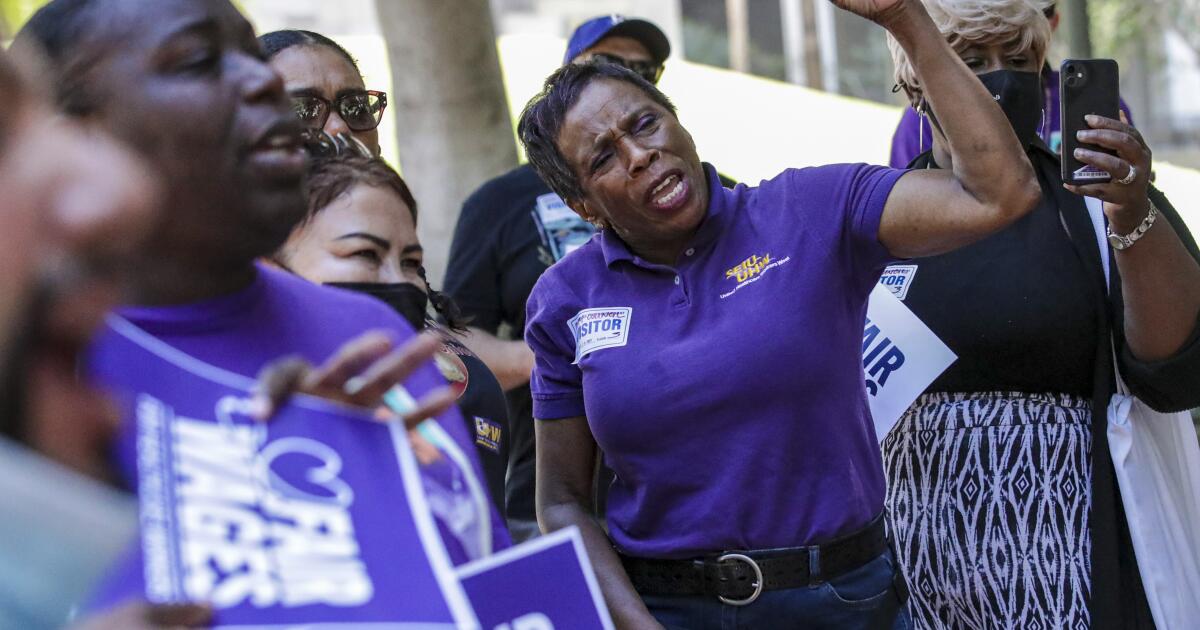Business
Tens of thousands of Kaiser healthcare workers to vote on possible strike

Tens of thousands of workers at Kaiser Permanente hospitals and clinics across the country will soon vote on whether to authorize a strike, union officials announced Thursday.
The Coalition of Kaiser Permanente Unions, which includes a dozen local unions with members in seven states and the District of Columbia, said voting would begin Saturday and extend into the middle of September. Any strike would start no earlier than Oct. 1.
More than 80,000 employees are represented by the coalition, which counts among its members a wide range of hospital and clinic workers including nursing assistants, phlebotomists, pharmacy technicians and housekeepers.
Union leaders said that if a strike moves forward, it would be the largest strike of healthcare workers in the history of the country. They faulted Kaiser for inadequate and unsafe staffing and said the healthcare giant had failed to bargain with them in good faith by refusing to provide them with crucial information during negotiations, among other unfair labor practices.
“Patient care is in crisis at Kaiser Permanente,” said Linda Bridges, president of one of the unions in the coalition, OPEIU Local 2 in Silver Spring, Md. “Staffing was decimated during the pandemic and it has not gotten any better. The problem we’re dealing with is Kaiser is not hearing us.
“Kaiser can and must do better. … They need to stop the unfair labor practices and address the healthcare staffing needs now.”
Dave Regan, president of SEIU United Healthcare Workers West, said any strike would be “fundamentally about the illegal bargaining conduct of Kaiser Permanente.” He said in recent days, Kaiser representatives “literally refused to even enter the room and talk to us.”
Kaiser Permanente said in a statement that it was “fully committed to reaching an agreement” with the unions in the coalition and was confident that they would reach an agreement before the end of September, when the contract expires.
It called strike authorizations a “common bargaining pressure tactic” and said the union announcement did not reflect any breakdown in bargaining, rejecting allegations that it had not bargained in good faith as “unfounded and counterproductive.” Kaiser also said that in its sixth formal negotiation session since April, it had put forward proposals on important issues including a minimum wage.
The union announcement is “a disappointing action considering our progress at the bargaining table. … We urge our employees to reject any call for a strike and continue to focus on providing care and service to the patients who need them,” Kaiser Permanente said in a statement.
Kaiser added that like other healthcare organizations, it had faced staffing challenges driven by the enduring effects of the pandemic, but said it had lower levels of worker turnover than average and was aggressively recruiting to fill more positions.
Regan, the SEIU-UHW president, said the coalition has proposed a $25 hourly minimum wage for its members across the Kaiser Permanente system, saying that “you cannot take care of a family in Los Angeles, San Diego, Denver, Washington, D.C., Seattle, Honolulu” on $19 to $21 an hour. He said Kaiser had recently proposed a much lower minimum — $21 an hour — in 2026.
Kaiser, in a written statement, said its philosophy is to provide competitive wages that are as much as 10% above the local market. “We cannot continue a national approach for determining wages and ignore local market conditions,” the employer said.